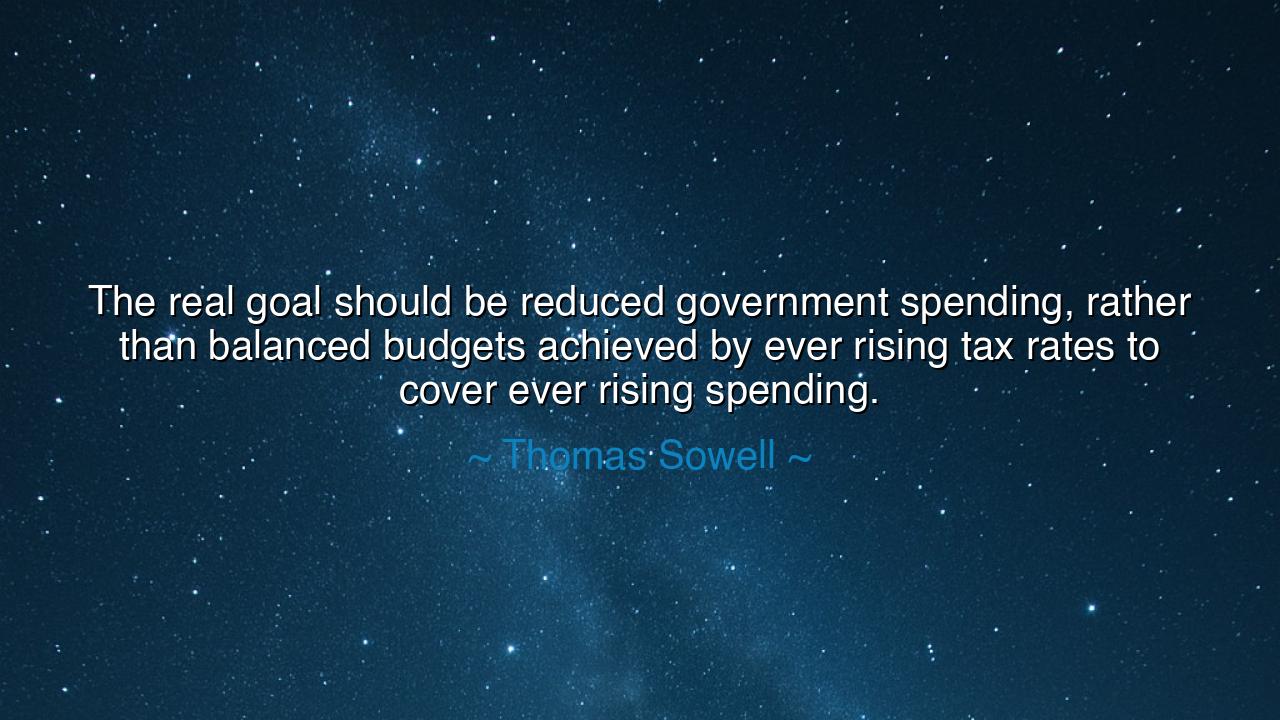
The real goal should be reduced government spending, rather than
The real goal should be reduced government spending, rather than balanced budgets achieved by ever rising tax rates to cover ever rising spending.






"The real goal should be reduced government spending, rather than balanced budgets achieved by ever rising tax rates to cover ever rising spending." – Thomas Sowell
In these sharp and enduring words, Thomas Sowell, one of the great economic philosophers of the modern age, exposes a truth often buried beneath the rhetoric of politics: that true fiscal wisdom lies not in endless balance, but in restraint. Sowell’s statement pierces the illusion that a government can forever tax its way into solvency, or that the answer to every deficit is to extract more from the pockets of the people. To reduce government spending is not merely an economic strategy—it is a moral discipline, a return to humility before the laws of reality. For as the ancients taught, no kingdom, no empire, no republic can live beyond its means forever.
The origin of this quote springs from Sowell’s lifelong study of economic history and his critique of government excess. He saw how nations, blinded by the promise of short-term prosperity, built vast bureaucracies that consumed more and more wealth while delivering less and less justice. His words were not aimed only at his own nation, but at all governments that mistake spending for strength and taxation for virtue. Like a physician diagnosing a fevered patient, Sowell points to the disease at the root of so many modern crises—the insatiable appetite of the state, cloaked in the noble language of progress.
History has proven his warning true. Consider the tale of the Roman Empire, that mighty civilization whose roads, armies, and monuments once seemed eternal. In its final centuries, Rome’s coffers drained beneath the weight of its own ambition. Taxes rose, corruption spread, and spending soared to maintain the grandeur of the state and the comforts of its citizens. Yet no tax could match the extravagance of its decline. Bread and circuses replaced discipline and virtue, and the empire that once conquered the world fell—not by sword alone, but by fiscal gluttony. The lesson of Rome, like Sowell’s warning, is clear: a government that consumes more than it creates will in time consume itself.
Even in our own era, the pattern repeats. In the late twentieth century, nations like Greece and Argentina learned this lesson through hardship. Each lived for a time beyond its means, promising prosperity through borrowed wealth and unchecked spending. When the reckoning came, it was not the rulers who suffered first—it was the ordinary citizen, burdened with higher taxes, shrinking savings, and shattered trust. Sowell’s insight reminds us that a government’s strength lies not in how much it spends, but in how wisely it stewards what it has been given. For fiscal restraint is not cruelty—it is justice across generations, ensuring that tomorrow’s children are not enslaved by today’s indulgence.
To balance a budget through ever-rising taxes, Sowell argues, is a false victory. It is the illusion of order purchased at the price of liberty. The people may see the numbers balanced on a page, but beneath them lies a growing imbalance in the lives of citizens—less freedom to build, less incentive to work, less power in the hands of the individual. Taxes that grow without end are like chains, light at first, but heavy over time. They bind not only the worker’s hand but the spirit of innovation itself. And when the state becomes both master and consumer, creativity starves, and progress halts.
Yet Sowell’s message is not one of despair—it is a call to wisdom and courage. To demand that leaders spend less requires strength; to live within one’s means, honor. The same virtues that sustain a household sustain a nation: prudence, foresight, and restraint. Just as a family cannot thrive by borrowing endlessly, neither can a government. The wise citizen, then, must not be dazzled by promises of boundless generosity from the public treasury, for generosity built on debt is but compassion borrowed from the future.
The lesson is eternal: prosperity is not born of expansion, but of discipline. Sowell’s words are a reminder to every generation that freedom is fragile, not because of enemies abroad, but because of appetites within. A government that learns to say “enough” preserves not only its wealth, but its soul. And so, let each citizen take up this duty—demand accountability, reject waste, and measure every policy not by its intentions, but by its cost. For in the end, nations, like men, rise not by what they spend, but by what they master. And mastery begins, always, with self-control.






AAdministratorAdministrator
Welcome, honored guests. Please leave a comment, we will respond soon